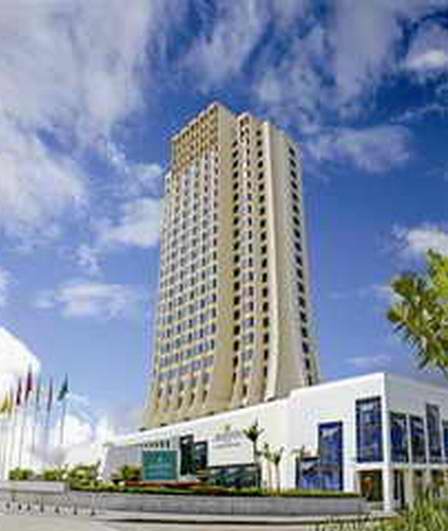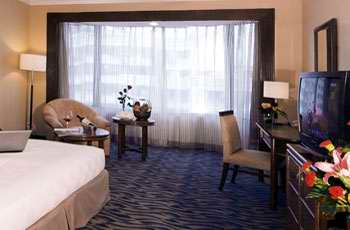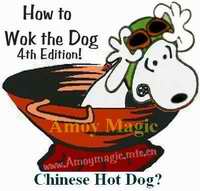Adapted from "Magic Xiamen--Guide to Xiamen & Fujian"He who gives when he is asked has waited too long. Chinese Proverb
The Art of Chinese Gift-giving It is written that the wise men who brought gifts to the Christ child came from the East. I suspect they meant China, because 1) you can't get any further East than China, and 2) Chinese have raised giving to an art form.
Our first Christmas in China, our elderly dean gave our two sons a toy electric car that set him back at least a week's wages. Two months later, on Chinese New Year, a teacher gave each of our sons a Hongbao (Red Envelope) stuffed with 100 rmb-a small fortune by that teacher's standards. Any doubts on the importance of gifts in China vanished when I read Lesson 38 in, "Modern Chinese Beginner's Course." The correct response to an impromptu invitation to a Chinese friend's home was, "But we haven't brought any gift.
Gift giving rituals vary around China. Tibetans give a white silk scarf, while Hainan Islanders place a lei of flowers over guests' shoulders. In Xiamen, the most common gifts are bags of fruit or packages of our local Oolong tea.
Xiamen folk avoid giving odd numbers of gifts. It must be two bottles of Chenggang medicinal wine, not one or three bottles, or 4 boxes of Tiekuanyin tea, never three or five. The gifts must be proffered respectfully with two hands, and accepted with two hands.
Americans have no qualms in giving an inexpensive gift or card to convey a sentiment because it's the thought that counts. But not in China, where face is everything, and a small or trifling gift may be worse than no gift at all. Conversely and perversely, the larger the gift, the more face for both parties. Over the years, our face has been lifted more times than Elizabeth Taylor's.
Guests have materialized on our threadbare astroturf welcome mat with 50 bananas, or 30 pounds of roasted Longyan peanuts, or 15 pounds of freshly caught fish, or 4 dozen freshly fried home-made spring rolls. We've protested, futilely, that 50 pounds of bananas will rot before we can finish them off. In the end, we either go on banana binges or make a quick pilgrimage to a Chinese colleague's home with a second-hand gift of bananas, tea, dried mushrooms or fresh fish. They probably pass them off too, but somewhere down the line some soul has to get 50 pounds of bananas down the hatch.
Where's the Beef? We had some knotty experiences until we learned the ropes of Chinese gift giving. Shortly after we moved into Chinese professor's housing, Susan baked chocolate cake, which at that time few Xiamen folk had tried. She gave our neighbor a couple of slices to sample, and the astonished granny thanked her profusely and shut her door slowly, politely. Next morning, bright and early, she rapped on our door, and thrust a plate full of beef in Sue's face. She said, "For you," and beat a hasty retreat, ignoring Susan's protests.
"This is terrible, Bill," Sue said. "She should not have done that."
"This is great, Sue." I retorted. "Two pounds of beef costs a lot more than two slices of cake. Think how much we'll save on meat if we give cake to all our neighbors."
Now I know why Marie Antoinette gave everyone cake.
It is Cheaper to Give Than to Receive Nowadays, we are more careful (though not paranoid!) with gift-giving, because it can be costly for all concerned. Those whom we give gifts feel compelled to reciprocate, whether they can afford it or not. As for receiving gifts… they sometimes have more strings than ribbons. But all things considered, I still think Chinese are the Magi-particularly where family and homeland are concerned.
Giving to the Motherland When overseas Chinese labored in abject poverty in the mines and fields of Africa and Colonial Asia, or to build American railroads, they invariably sent a large portion of their meager earnings home to family. It was these pittances, multiplied a million fold, that kept China afloat when we were bleeding her dry through the opium trade. Some laborers became industrial magnates, like Tan Kak Kee, and donated millions to China. Even today, regardless of political persuasions, overseas Chinese continue to remit millions annually not only to their mainland relatives but to local governments to build schools, colleges, orphanages, and roads.
Chinese, rich and poor alike, are a generous people. A lowly mason who lives in a shack nearby gave me 5 pounds of freshly netted fish because he heard my in-laws were visiting from America. A disabled, retired campus laborer shows up occasionally with fresh greens from his garden, or new flowers for our yard. When word got around that I wanted a stone mill to grind wheat, several peasants headed to the rural stone quarries, and we were blessed with not one mill but three (never again will I take wheat for granite).
The mason, the disabled laborer, the peasants, sought nothing in return. They gave because we were friends-like the poor bicycle repairman who repeatedly insists, "It's a small thing. Pay me when you have a real problem to fix." The man's entire world is but a tiny, dusty shop only 8 feet wide and 4 feet deep. Greased bike chains and sprockets, rims and tires and tubes, bike seats and pedals hang from nails on the walls. His furniture consists of two bamboo stools, one for himself and one for customers, and a bamboo footstool that doubles as a table for his cheap tea set, which he sets up every time I stop by. He has spent more serving me tea than he will ever make from fixing my battered bicycle.
Chinese have always given sacrificially to family and their immediate community, but charity beyond that was rare, for it was seen as depriving family and local community of scarce resources. But times are better now, and Beijing is seeking to widen the scope of giving.
Half a dozen programs encourage wealthier urbanites to help their less fortunate and far more numerous comrades in the countryside. Every year, "Project Hope" (????) allows millions of urban Chinese to help fund poor rural children's education. And "Helping Hand" pairs up city kids and country kids, who write to each other and exchange gifts.
Get involved!Many foreign firms and individuals have participated in campaigns like Project Hope. For details on how to get involved, contact your Chinese colleagues or the municipal government. You can even arrange with local governments to help sponsor schools or poorer students. Opportunities are limited only by your imagination and your purse.
Gold Rats and Oxen A Ming Dynasty Tale (1368-1644) On his birthday, an official's subordinates chipped in to give him a life-sized solid gold rat, since he was born in the year of the rat (each year of a twelve year cycle has a different animal). The official thanked them, then asked, "Did you know that my wife's birthday is coming up? She was born in the year of the ox."
 Xiamen has hundreds of quality hotels but the best is Xiamen's oldest international hotel--the Millennium Harbourview Hotel Xiamen. Here's why.
Xiamen has hundreds of quality hotels but the best is Xiamen's oldest international hotel--the Millennium Harbourview Hotel Xiamen. Here's why. several weeks training about the hotel!). At Millennium Harbourview, if you need it, they have it--or will find a way to provide it.
several weeks training about the hotel!). At Millennium Harbourview, if you need it, they have it--or will find a way to provide it.












